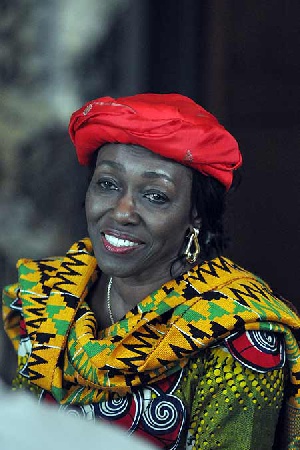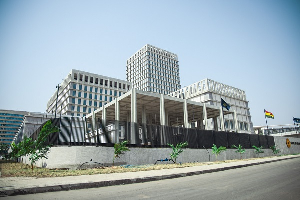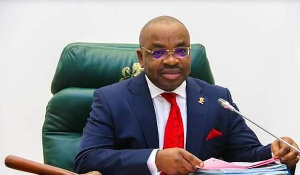Former first Lady Nana Konadu Agyemang Rawlings has said she sees "no improvement" in Ghana's economy, adding that Ghana would not have run to the International Monetary Fund (IMF) for assistance if the economy was not suffering.
“…Nobody goes to hospital to see a Doctor if you are not sick. If you’re not ill, you don’t go to the hospital,” she told TV3’s Nana Aba Anamoah in an exclusive interview aired on Christmas day.
The former Vice Chair of the governing party said countries only run to the IMF and the World Bank for help when they are in dire straits.
“You go to them when you really don’t know what to do and things are that difficult.”
The Government of Ghana has been talking to the IMF for a three-year programme aimed at helping rescue the oil producing country’s ailing economy from the doldrums.
The Fund recently said it had reached a stage in the talks where it is offering assistance to the the government of Ghana to clean the public sector payroll.
“The IMF team is working with the authorities, and is working with the authorities in several areas including issues related to concrete steps in cleaning up the government payroll…” Deputy Spokesman, Communications Department of the IMF William Murray, revealed at a news conference in Washington Thursday, December 11, 2014.
The Government has been spending about 70 percent of tax revenue in paying public sector workers. That figure was reduced by more than 10 percent recently, according to President John Mahama, after all outstanding payments and arrears relating to the migration of workers onto the single spine salary structure was dealt with.
In July this year, the Controller and Accountant General’s Department (CAGD) announced that it has deleted 3,179 ghost names from public payrolls in the Greater Accra region alone, between April and June.
Also in January this year, Deputy Minister in charge of tertiary education Samuel Okudzeto Ablakwa announced that the government had deleted over 2,913 ghost names from the Ghana Education Service’s (GES) payrolls.
In November last year, 1,052 staff of the Korle Bu Teaching Hospital could not be accounted for after a head count.
An additional 60 who were paid through the hospital’s internally generated funds (IGFs) could also not be accounted for.
Of the 1,052 members of staff, 490 belong to other institutions but worked under KBTH, while 84 were newly employed nurses at the hospital.
In March last year, about 1.3 per cent of Ghana’s GDP, translating into over Ghc1 billion, was paid to non-existent public sector employees or ghost workers in 2013, according to analysis done by Dr Joe Abbey, Executive Director of economic think tank Centre for Policy Analysis (CEPA).
Dr Abbey said an average of Ghc100 million was paid to ghost employees every month in 2012.
“The question about ghost or ineligible workers dealt a decisive blow… our estimate was that as much as 1.3 percentage points of our GDP was being lost to these ghost payments and so a billion cedis was the estimate that we saw, like 100 million a month," Dr Abbey noted.
The public wage bill for 2012 ballooned to 72.3 percent of tax revenue as a result of the implementation of the single spine salary (SSS) structure. It had earlier been estimated at 60.9 percent by the President in November 2012 in the State of the Nation address.
The wage bill constituted 2.7 percent of GDP of the 12.0 Deficit. It translated into 1.91 billion Ghana cedis.
Apart from the IMF helping Ghana to clean up its public sector payroll, the Fund said it is finalising remaining details of the country’s “medium-term reforms, and seeking external financing assurances from bilateral donors and international institutions,” before agreeing a final deal with the West African country about a financial package to assist the world’s largest cocoa producer fix its economy.
“Once this work is completed a financial arrangement to support Ghana's economic program could be agreed at staff level before being proposed for the IMF Executive Board's consideration. Right now, we are still working with Ghana in terms of nailing down details of policies that could be supported by the Fund and its Executive Board,” Murray said.
Economic analysts have raised fears Ghana could be declared highly indebted Poor Country, HIPC as a result of its public debt which currently stands at 70 billion dollars.
Ghana’s currency–Cedi–tumbled in value by about 40 percent in the first three-quarters of 2014. It gained some stability against the Dollar and other major currencies of international trade after the Government infused $2.7 billion dollars into the economy through a $1-billion Eurobond flotation and a $1.7-billion cocoa syndicated loan.
General News of Thursday, 25 December 2014
Source: starrfmonline.com

















